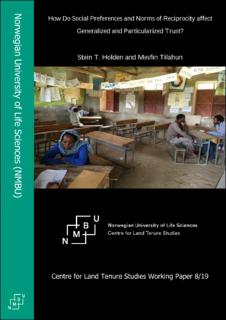| dc.contributor.author | Holden, Stein T. | |
| dc.contributor.author | Tilahun, Mesfin | |
| dc.coverage.spatial | Ethiopia | en_US |
| dc.date.accessioned | 2020-02-18T12:31:57Z | |
| dc.date.available | 2020-02-18T12:31:57Z | |
| dc.date.issued | 2019 | |
| dc.identifier.uri | https://hdl.handle.net/11250/2642286 | |
| dc.description.abstract | We study how social preferences and norms of reciprocity are related to generalized and particularized trust among members of youth business groups in northern Ethiopia. Members of these groups are recruited among land-poor rural youth. The Ethiopian government promotes youth employment among land-poor rural youth by allocating them rehabilitated communal lands for the formation of sustainable businesses. The groups are organized as primary cooperatives, elect their own board, make their own bylaw and prepare a business plan that has to be accepted by the local government. The typical sustainable production activities that the groups are allowed to invest in include apiculture, forestry, horticulture, and livestock production. A recent study found that they to a large extent organize themselves according to Ostrom’s Design Principles (Ostrom 1990; 2010; Holden and Tilahun 2018) and that group performance, including trust, is positively correlated with the degree of compliance with the Design Principles.
Our study has used incentivized experiments to elicit social preferences and trust. We use data from 2427 group members in 246 functioning business groups collected in 2019. We find that members with altruistic preferences have stronger norms of reciprocity and are more trustworthy and trusting both in outgroup and ingroup contexts. The norm of reciprocity is stronger in groups with a higher share of altruistic members and this enhances both generalized and particularized trust. The average levels of trust and trustworthiness among group members were low, even in the African context, but there were large variations in average levels of trust and trustworthiness across groups. We can, therefore, rule out that high levels of trust and particular social preferences are necessary for the stability achieved by the majority of these recently established youth business groups in northern Ethiopia. This indicates that the model is quite robust and may be replicable elsewhere. | en_US |
| dc.language.iso | eng | en_US |
| dc.publisher | Norwegian University of Life Sciences, Ås | en_US |
| dc.relation.ispartofseries | CLTS Working paper;8/19 | |
| dc.rights | Attribution-NonCommercial-NoDerivatives 4.0 Internasjonal | * |
| dc.rights.uri | http://creativecommons.org/licenses/by-nc-nd/4.0/deed.no | * |
| dc.title | How do social preferences and norms of reciprocity affect generalized and particularized trust? | en_US |
| dc.type | Working paper | en_US |
| dc.subject.keyword | Trust | |
| dc.subject.keyword | Youth | |

